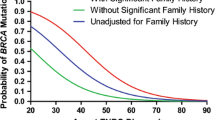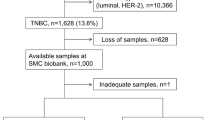Abstract
Background
Revised NCCN guidelines recommend that women ≤60 years with triple-negative breast cancer (TNBC) be referred for consideration of genetic counseling. Small, homogeneous samples have limited evaluation of BRCA mutation prevalence among different ethnicities affected by TNBC subtype. We sought to determine whether the prevalence of BRCA mutations within a TNBC cohort differs by demographic factors.
Methods
We performed a retrospective review of patients with TNBC referred for genetic counseling at two academic Hereditary Cancer Clinics between 2000 and 2012. Demographic data were collected, including age at diagnosis and race/ethnicity. Race was categorized as African American (AA), Ashkenazi Jewish (AJ), Asian, Caucasian, Hispanic, or other. Primary outcome was BRCA mutation status, analyzed by race/ethnicity and age at diagnosis.
Results
A total of 469 patients with TNBC who underwent testing for BRCA genetic mutations were identified, of which 450 patients had evaluable BRCA testing results; 139 (30.8 %) had confirmed BRCA1 (n = 106) or BRCA2 (n = 32) mutations. BRCA mutation prevalence differed by ethnicity and race: AA (20.4 %), AJ (50 %), Asian (28.5 %), Caucasian (33.3 %), and Hispanic (20 %). The prevalence of genetic mutations also differed by age at diagnosis: <40 years (43.8 %), 40–49 years (27.4 %), 50–59 years (25.3 %), 60–69 years (12.5 %), and >70 years (16.6 %).
Conclusions
The prevalence of genetic mutations among women with TNBC referred for genetic counseling is high and differs significantly by ethnicity/race and age. This data helps to refine mutation risk estimates among women with TNBC, allowing for more personalized genetic counseling potentially aiding in improved patient decision-making.

Similar content being viewed by others
References
Daly MB, Axilbund JE, Buys S, et al. Genetic/familial high-risk assessment: breast and ovarian. J Natl Compr Cancer Netw. 2010;8:562–94.
Young SR, Pilarski RT, Donenberg T, et al. The prevalence of BRCA1 mutations among young women with triple-negative breast cancer. BMC Cancer. 2009;9:86.
Gonzalez-Angulo AM, Timms KM, Liu S, et al. Incidence and outcome of BRCA mutations in unselected patients with triple-negative breast cancer. Clin Cancer Res. 2011;17(5):1082–9.
Hartman AR, Kaldate RR, Sailer LM, et al. Prevalence of BRCA mutations in an unselected population of triple-negative breast cancer. Cancer. 2012;118:2787–95.
Robertson L, Hanson H, Seal S, et al. BRCA1 testing should be offered to individuals with triple-negative breast cancer diagnosed below 50 years. Br J Cancer. 2012;106:1234–8.
National Comprehensive Cancer Network, NCCN Guidelines Version 2.2013. Hereditary Breast and/or Ovarian Cancer Syndrome. NCCN.org.
Comen E, Davids M, Kirchoff T, et al. Relative contributions of BRCA1 and BRCA2 mutations to “triple-negative” breast cancer in Ashkenazi women. Breast Cancer Res Treat. 2011;129:185–90.
Warner E, Foulkes W, Goodwin P, et al. Prevalence and penetrance of BRCA1 and BRCA2 gene mutations in unselected Ashkenazi Jewish women with breast cancer. J Natl Cancer Inst. 1999;91:1241–7.
Armstrong K, Calzone K, Stopfer J, et al. Factors associated with decisions about clinical BRCA1/2 testing. Cancer Epidemiol Biomark Prev. 2000;9:1251.
Hall MJ, Reid JE, Burbige LA, et al. BRCA1 and BRCA2 mutations in women of different ethnicities undergoing testing for hereditary breast-ovarian cancer. Cancer. 2009;115:2222–33.
Berry DA, Iversen ES, Gudbjartsson DF, et al. BRCAPRO validation, sensitivity of genetic testing of BRCA1/BRCA2, and prevalence of other breast cancer susceptibility genes. J Clin Oncol. 2002;20:2701–12.
Tai YC, Chen S, Parmigiani C, et al. Incorporating tumor immunohistochemical markers in BRCA1 and BRCA2 carrier prediction. Breast Cancer Res. 2008;10(2):401.
Kwon JS, Gutierrez-Barrera AM, Young D, et al. Expanding the criteria for BRCA mutation testing breast cancer survivors. J Clin Oncol. 2010;28:4214–20.
Robson ME, Storm CD, Weitzel J, et al. American Society of Clinical Oncology policy update: genetic and genomic testing for cancer susceptibility. J Clin Oncol. 2010;28:893–901.
American Society of Clinical Oncology. American Society of Clinical Oncology policy statement update: genetic testing for cancer susceptibility. J Clin Oncol. 2003;21:2397–406.
Author information
Authors and Affiliations
Corresponding author
Rights and permissions
About this article
Cite this article
Greenup, R., Buchanan, A., Lorizio, W. et al. Prevalence of BRCA Mutations Among Women with Triple-Negative Breast Cancer (TNBC) in a Genetic Counseling Cohort. Ann Surg Oncol 20, 3254–3258 (2013). https://doi.org/10.1245/s10434-013-3205-1
Received:
Published:
Issue Date:
DOI: https://doi.org/10.1245/s10434-013-3205-1




